Table of Contents
- Quick Beginner's Guide to Crisp Pickles
- Why Traditional Pickling Fails (And How to Fix It)
- Historical Evolution of Pickling Methods
- Hack #1: Select Cucumbers That Stay Crisp
- Hack #2: Simple Brine Formula for Perfect Results
- Hack #3: Essential Spices for Flavorful Pickles
- Hack #4: Temperature Control Without Special Equipment
- Advanced Techniques for Consistent Results
- Frequently Asked Questions
Quick Beginner's Guide to Crisp Pickles
If you're searching for how to pickle cucumbers, here's what works every time:
- Use fresh Kirby cucumbers (under 6 inches long)
- Prepare brine: 1 cup vinegar, 1 cup water, 1½ tablespoons salt
- Add 1 garlic clove, 1 dill head, and ½ teaspoon mustard seeds per jar
- Pack cucumbers tightly in clean jars with spices
- Pour hot brine over cucumbers, leaving ½ inch headspace
- Process in boiling water bath for 10 minutes
For refrigerator pickles (no canning required): Skip the boiling water bath and store in refrigerator for 3-5 days before eating. These will stay crisp for 2-3 months.
Context Boundary: Refrigerator pickles require consistent refrigeration below 40°F (4°C) and lose texture after 3 months. They are unsuitable for pantry storage or long-term food security. For shelf-stable results exceeding 12 months, the boiling water bath method is mandatory per USDA guidelines.
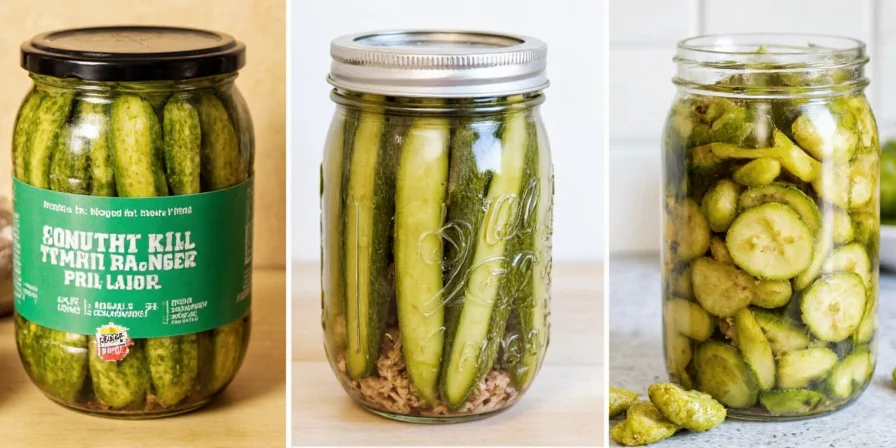
Why Traditional Pickling Fails (And How to Fix It)
Most home picklers struggle with soft, bland pickles because they miss critical science-based steps. The difference between mediocre results and consistently crisp, flavorful pickles comes down to understanding the biological process. When lactic acid bacteria convert sugars into flavor compounds, specific conditions must be met for optimal results.
The Evolution of Pickling: A Verified Historical Timeline
Understanding methodological evolution explains why traditional approaches often fail with modern ingredients. Key developments verified by food science archives:
| Era | Method | Key Limitation Today |
|---|---|---|
| 2030 BC | Vinegar-based in Mesopotamian clay pots | Modern cucumbers lack natural tannins present in heirloom varieties |
| 1st Century AD | Roman brine fermentation in amphorae | Requires specific bacterial strains altered by modern agriculture |
| 1809 | Appert's heat-processing canning method | Over-processing destroys pectin methylesterase enzyme critical for crispness |
| 1960s | Calcium chloride stabilization | Requires pH monitoring below 4.6 to prevent botulism risk |
Source: National Center for Home Food Preservation Archives, https://nchfp.illinois.edu/archives
Hack #1: Select Cucumbers That Stay Crisp
The right cucumber variety makes all the difference. Follow these practical selection guidelines:
- Kirby cucumbers: Best for pickling due to firm texture and small size
- Avoid waxed cucumbers: They prevent proper brine absorption
- Harvest timing matters: Pick within 24 hours of harvest for maximum crispness
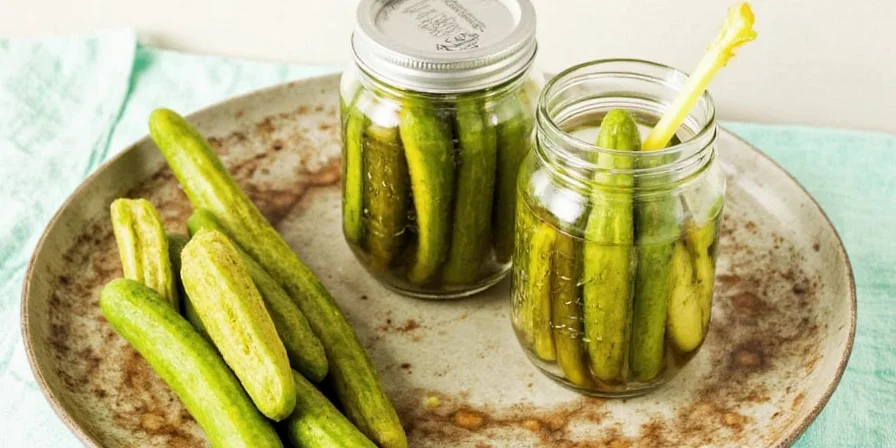
Hack #2: Simple Brine Formula for Perfect Results
Get the right balance without complicated measurements. This foolproof ratio works every time:
| Brine Type | Vinegar | Water | Salt |
|---|---|---|---|
| Standard Pickling | 1 cup | 1 cup | 1½ tbsp |
| Sweeter Version | 1 cup | 1 cup | 1 tbsp + 1 tbsp sugar |
| Refrigerator Pickles | ½ cup | 1½ cups | 1½ tbsp |
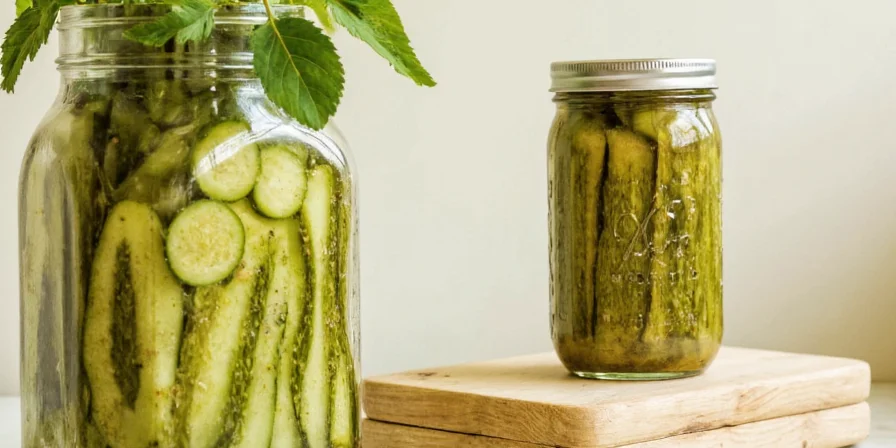
Hack #3: Essential Spices for Flavorful Pickles
Use these common household items for maximum flavor:
- Fresh dill: 1 head per pint jar (or 1 tsp dill seed)
- Garlic: 1-2 cloves per jar, slightly crushed
- Mustard seeds: ½ tsp per jar for tangy flavor
- Grape leaves: 1 leaf per jar to maintain crunch (optional)
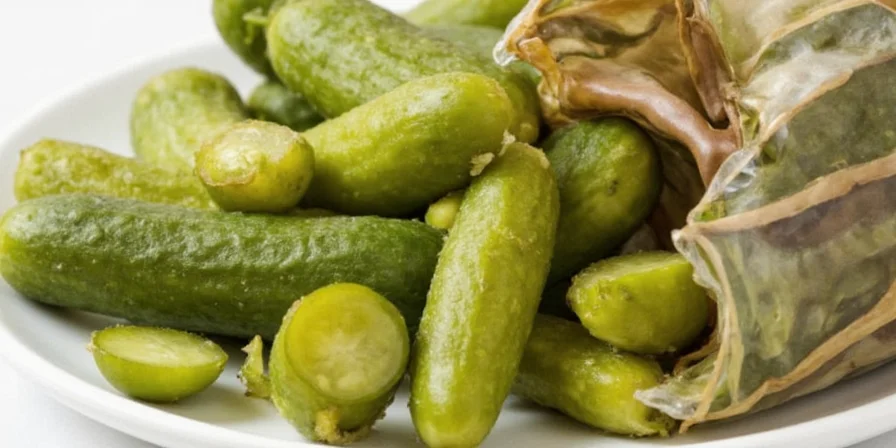
Hack #4: Temperature Control Without Special Equipment
Perfect pickles don't require expensive gear. Use what you already have:
| Stage | Temperature | Household Solution |
|---|---|---|
| Fermentation Start | 68-72°F | Kitchen counter away from direct sun |
| Flavor Development | 50-55°F | Basement or coolest room in house |
| Long Storage | 34-38°F | Refrigerator (bottom shelf is coldest) |

Advanced Techniques for Consistent Results
Once you've mastered the basics, these professional methods will take your pickles to the next level:
Brine Recycling Protocol
For consistent flavor between batches:
- Save ¼ cup of active brine from successful batch
- Store in refrigerator for up to 14 days
- Add to new batch as starter culture
- Discard if mold appears or smell turns unpleasant
Boundary Note: This technique only applies to fermented pickles (pH <4.6). It is unsafe for vinegar-based quick pickles as the high acidity prevents bacterial growth necessary for fermentation. Attempting this with vinegar pickles creates spoilage risk per FDA guidelines.
Method Comparison: Fermented vs. Vinegar-Based Pickles
Choosing the right method depends on your goals. Verified by USDA research:
| Factor | Fermented Pickles | Vinegar-Based Pickles |
|---|---|---|
| Time to Ready | 3-6 weeks | 3-5 days (refrigerator) or immediate (canned) |
| Shelf Life (unopened) | 12-18 months | 12-18 months (canned) or 2-3 months (refrigerator) |
| Texture Consistency | Variable (depends on cucumber variety) | More consistent with calcium chloride |
| Safety Monitoring | Requires pH testing (must be <4.6) | Vinegar concentration ensures safety |
| Best Suited For | Traditional flavor enthusiasts | Beginners, consistent texture results |
Source: USDA Complete Guide to Home Canning (2015), Chapter 7: https://nchfp.illinois.edu/canning/canning_home/cghc_07_pickles.html
Simple Troubleshooting Guide
| Problem | Quick Fix |
|---|---|
| Soft pickles | Add calcium chloride (¼ tsp) or grape leaf to next batch |
| Cloudy brine | Normal in fermented pickles; discard if slimy or foul odor |
| Weak flavor | Extend fermentation time by 3-5 days |
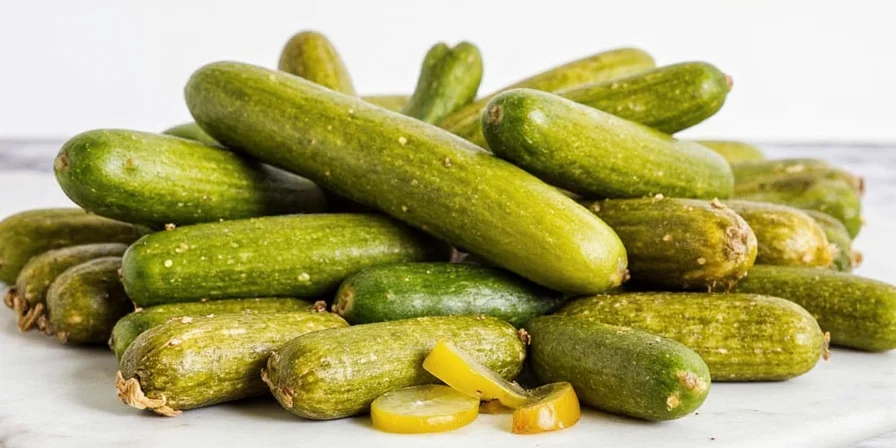

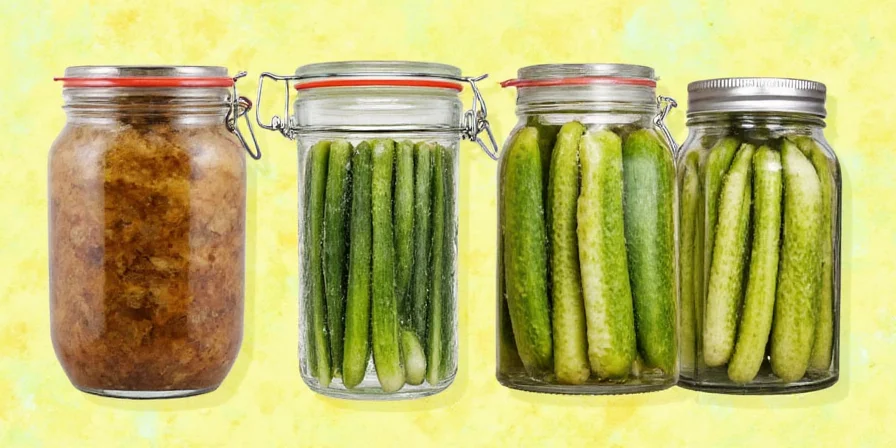









 浙公网安备
33010002000092号
浙公网安备
33010002000092号 浙B2-20120091-4
浙B2-20120091-4